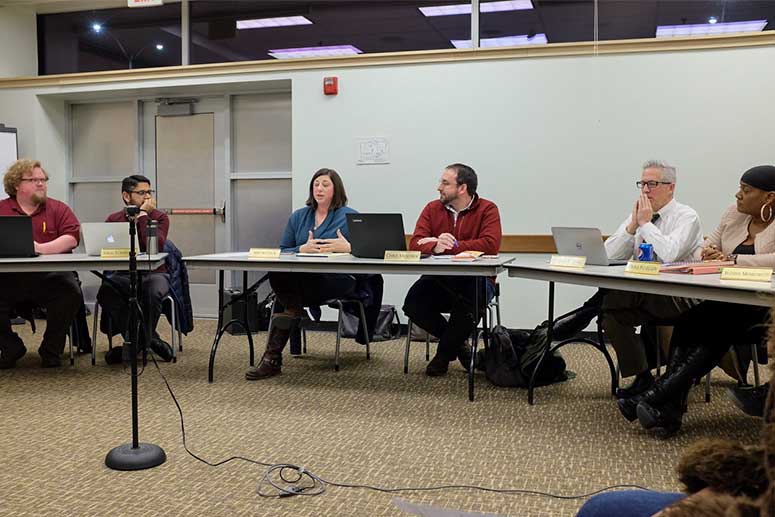Documenters.org comes to Cleveland
 Jack ValancyDozens of local governmental bodies meet year round. Documenters.org plans to post their schedules and minutes in one convenient location online. Here, the Cleveland Heights-University Heights Public Library System meets in 2018.
Jack ValancyDozens of local governmental bodies meet year round. Documenters.org plans to post their schedules and minutes in one convenient location online. Here, the Cleveland Heights-University Heights Public Library System meets in 2018.
More than 150 local governmental entities hold regular meetings in the Cleveland-Akron area. What's a watchdog to do?
City Bureau has an answer. The Chicago-based nonprofit civic journalism lab plans to debut an online database for Northeast Ohio by the end of the year.
The free website, documenters.org, began in Chicago three years ago and spread to Detroit, posting daily updates on public meetings.
"As newspapers shut down, reporting on local government is often one of the first things to go," says City Bureau co-founder Darryl Holliday. "But it's always one of the most important things that we keep an eye on." Citizen watchdogs are increasingly needed these days to fill the growing gap in news coverage, he says.
"Local government is much more diffuse than people tend to think of it as, and meeting information, locations, dates, times, and records are often only posted physically in City Hall," Holliday says. "Our goal for documenters.org was to bring all of that information together at the county level in one centralized location to make it easier for us down the road to send documenters, just regular Chicagoans and Detroiters, out to these meetings."
The Cleveland Foundation is contributing $20,000 to the first phase, the open source City Scrapers project. The Akron Community Foundation is on board too. "It puts all the different governmental bodies in one place," says Michael Murphy, chief marketing officer for the Cleveland Foundation. "I've seen how it works in Chicago and Detroit, and having it all in one place is very helpful, not just for citizens but for reporters as well."
City councils, school boards, planning commissions, zoning boards, finance committees, and other agencies many people have never even heard of will be tracked. You can search the website by theme or time or agency name. "We want to make it as easy as possible for people to get involved in policy decisions but also to increase government transparency," Holliday says.
Phase two, if there's interest here, would train and pay residents to monitor these government meetings. In Chicago and Detroit, 1,000 people have enrolled in the program, and 500 of them have been trained, he says. They are paid $16 an hour to cover meetings. City Bureau also hired reporters to curate and analyze the information the documenters submit. "Anything that government bodies put out, we will collect and standardize and make it searchable," Holliday says.
The benefits are two-fold, he says. "There's civic engagement value, where people are more connected and in some ways critical but have an actual path toward transparency in that city. And we're producing quality information that didn't exist before."
They still aren't sure if the second phase of the project will go forward here, Holliday says. "If Clevelanders and Akronites do want to see a full-fledged documenters program and to bring on community members to serve as documenters and get paid in the process, we'll be looking for media partners and community partners. We are a journalism organization, but we are very firmly rooted in and supportive of organizers, people who are actively working in communities."
